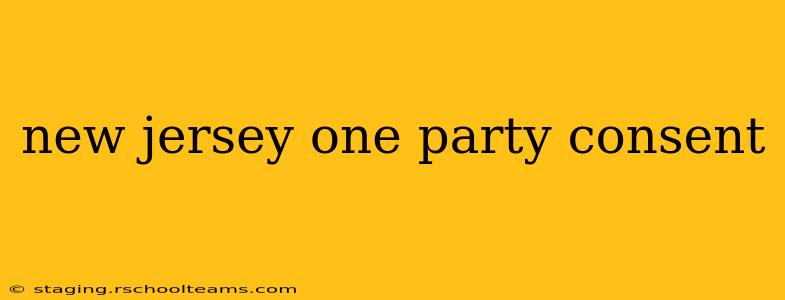New Jersey is a one-party consent state when it comes to recording conversations. This means that only one participant in a conversation needs to be aware of the recording for it to be legal. This seemingly simple concept has several nuances, and understanding the specifics is crucial to avoid legal trouble. This guide will delve into the intricacies of New Jersey's one-party consent laws, addressing common questions and concerns.
What Does "One-Party Consent" Mean in New Jersey?
In essence, New Jersey's one-party consent law allows you to record a conversation as long as you are a party to that conversation and you are aware of the recording. You don't need the consent of other participants. This is different from two-party consent states, where everyone involved must agree to the recording. This means you can legally record a phone call, a meeting, or any other conversation as long as you're a participant.
Is it Legal to Record a Conversation in New Jersey Without the Other Person Knowing?
Yes, it is legal in New Jersey to record a conversation without the other person knowing, provided you are a participant in the conversation. However, ethical considerations should always be taken into account. While the law allows it, secretly recording someone might have reputational or interpersonal consequences.
What are the Exceptions to New Jersey's One-Party Consent Law?
While New Jersey is generally a one-party consent state, there are exceptions. These exceptions typically involve situations where privacy is paramount, such as:
-
Private Conversations: While the law doesn't explicitly define "private," recording someone in a place where they reasonably expect privacy (like a bathroom or changing room) could be considered illegal, even if you're a participant. The intent and context are important factors here.
-
Confidential Communications: Recording communications protected by attorney-client privilege or other forms of confidentiality is illegal.
-
Misrepresentation: If you misrepresent yourself to gain access to a conversation for the purpose of recording it, you could be violating the law. This could involve pretending to be someone you're not to obtain information.
-
Specific Statutes: Other state or federal laws might supersede New Jersey's one-party consent laws in specific situations.
Can I Record a Conversation in New Jersey if I'm Not a Participant?
No. New Jersey's one-party consent law explicitly requires that you be a participant in the conversation to legally record it. Recording a conversation where you're not involved is a violation of privacy and is illegal.
What are the Penalties for Illegally Recording a Conversation in New Jersey?
The penalties for illegally recording a conversation in New Jersey can vary depending on the specifics of the situation and the intent behind the recording. Potential consequences could include:
-
Civil lawsuits: The person whose conversation was illegally recorded could sue you for damages.
-
Criminal charges: In certain cases, illegally recording a conversation could lead to criminal charges, depending on the context and intent.
-
Evidence inadmissibility: Illegally obtained recordings are likely to be inadmissible in court.
Can I Use a Recording Made in New Jersey in Court?
A recording made in compliance with New Jersey's one-party consent law is generally admissible in court as evidence, provided it is relevant to the case and meets other rules of evidence. However, recordings made in violation of the law are inadmissible. The quality of the recording and its authenticity are also important factors in its admissibility.
What if I'm Unsure if My Recording is Legal?
When in doubt, it's always best to err on the side of caution. If you're unsure whether a particular recording is legal under New Jersey law, it's advisable to seek legal counsel. An attorney can provide expert advice based on the specifics of your situation.
Disclaimer: This information is for educational purposes only and does not constitute legal advice. For specific legal advice regarding New Jersey's one-party consent laws, consult with a qualified attorney.
